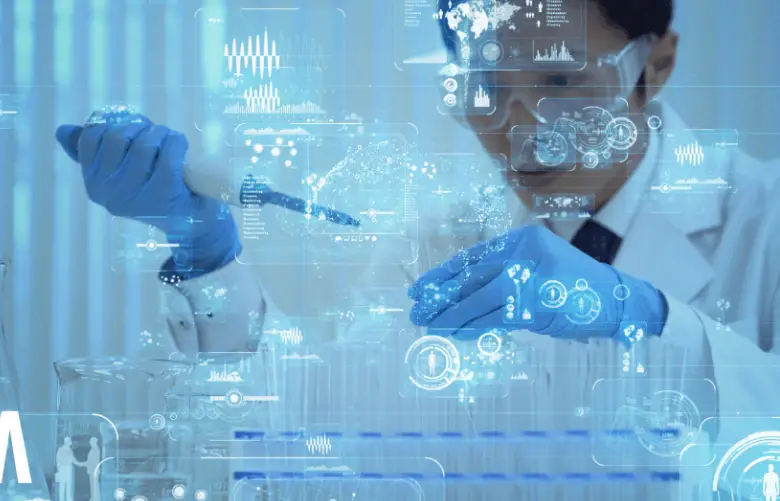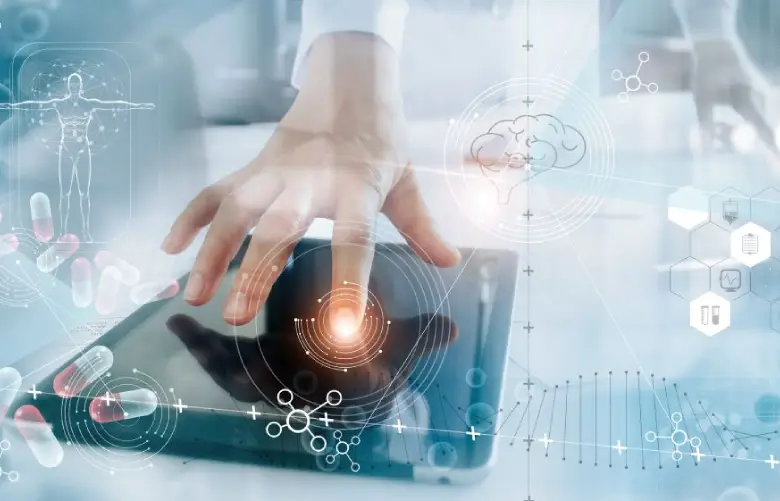In modern medicine, a remarkable transformation is unfolding, driven by integrating artificial intelligence (AI) into healthcare practices. Once relegated to science fiction, this synergy of technology and healthcare is now a tangible reality with the potential to revolutionize every facet of medical care.
From diagnosing complex diseases with unprecedented accuracy to streamlining administrative tasks, AI’s transformative power knows no bounds. In the section below, we’ll dive into the remarkable transformations of AI in healthcare today, ushering in a new era where technology and compassion converge for the wellbeing of all.
So, let’s get started.
Revolutionizing Drug Discovery with Artificial Intelligence
Discovering new drugs has long been an intricate and time-consuming endeavor, requiring years of research, trials, and a fair bit of luck. However, with the advent of Artificial Intelligence (AI), this landscape is undergoing a seismic shift. AI algorithms can swiftly analyze massive datasets, including molecular structures and biological interactions, to identify potential drug candidates with a level of efficiency and accuracy that was previously unattainable.
By simulating and predicting how molecules might interact with the body, AI in healthcare expedites the identification of promising compounds, saving researchers invaluable time and resources. This technology accelerates drug discovery and offers insights into personalized medicine, tailoring treatments to individual genetic makeup.
While challenges persist, such as ensuring the safety of AI-generated compounds, the synergy between AI and drug discovery presents a tantalizing promise of quicker, more targeted solutions for pressing medical needs.
Here are 14 Machine Learning in Healthcare Examples to Know.


POSTGRADUATE PROGRAM IN
Data Science & AIML
Learn Data Science, AI & ML to turn raw data into powerful, predictive insights.
Artificial Intelligence in Healthcare: Innovations and Applications
Integrating Artificial Intelligence in healthcare is reshaping the medical landscape by introducing myriad innovations and applications. AI in healthcare is being harnessed to interpret medical images like X-rays and MRIs with remarkable accuracy, aiding in early disease detection and diagnosis. Additionally, AI-driven predictive analytics transform patient care by forecasting disease trends and optimizing hospital resource allocation.
Virtual health assistants powered by AI are enhancing patient engagement and providing round-the-clock support, while natural language processing allows for seamless analysis of vast medical literature, aiding clinicians in staying up-to-date with the latest research.
AI in healthcare also plays a crucial role in genomics, enabling rapid DNA sequencing and personalized treatment plans. As these applications continue to expand, challenges like data privacy and regulatory compliance must be addressed. Still, the potential of AI to improve patient outcomes and streamline healthcare processes remains truly promising.
Harnessing AI for Drug Discovery and Healthcare Advancements
In the world of medicine, the marriage of Artificial Intelligence in healthcare with drug discovery is propelling remarkable advancements. AI in healthcare is like a powerful assistant for scientists and doctors, helping them uncover new medicines and enhance healthcare practices. Regarding drug discovery, AI dives deep into massive amounts of data to identify potential drugs faster than ever. This technology predicts how molecules interact in our bodies, guiding researchers towards effective treatments with incredible speed.
Artificial Intelligence in healthcare assists doctors by interpreting complex medical images, foreseeing health trends, and even providing virtual support to patients. While AI in healthcare brings immense promise, it also brings challenges, such as securing patient data. Nonetheless, by using AI’s potential to its fullest, we’re opening doors to a future where medical breakthroughs and personalized care are more accessible than we ever imagined.
Data Analytics is a Hot Career Destination for India’s Youth that you must choose.
The Role of Artificial Intelligence in Revolutionizing Healthcare
Artificial Intelligence in healthcare drives a revolution by fundamentally reshaping how medical services are delivered. With its rapid data processing and analysis capabilities, AI in healthcare enables timely and accurate decision-making for medical professionals. From early disease detection to personalized treatment plans, AI optimizes patient care.
However, this transformation also presents challenges, including ethical and data privacy concerns. As AI in healthcare continues to evolve, its integration into healthcare promises to enhance outcomes, streamline processes, and pave the way for more accessible and effective medical solutions, ultimately improving the overall quality of healthcare for individuals and society.
AI-Powered Drug Discovery: Transforming the Pharmaceutical Industry
AI-powered drug discovery is revolutionizing the pharmaceutical landscape. By harnessing vast datasets and predictive algorithms, AI expedites the identification of potential drug candidates, significantly reducing time and costs. This transformative approach accelerates target identification, molecule design, and clinical trial optimization. However, challenges such as model interpretability and data quality must be navigated.
As AI in healthcare continues to advance, it holds the potential to reshape how new medications are developed, enabling more efficient and targeted solutions to pressing medical needs and ultimately transforming the way the pharmaceutical industry operates.
Advancing Healthcare through Artificial Intelligence and Drug Discovery
Powerful Data Analysis
Artificial Intelligence in healthcare is driving advancements in healthcare by swiftly analyzing vast amounts of medical data, aiding in quicker and more precise decision-making.Personalized Treatment Plans
AI in healthcare caters to individuals by considering their unique genetic makeup, medical history, and lifestyle, leading to personalized treatment strategies.Medical Imaging Interpretation
AI in healthcare enhances diagnostic accuracy by deciphering intricate medical images like X-rays, MRIs, and CT scans, assisting doctors in detecting diseases at earlier stages.Predictive Analytics
AI predicts disease trends and outbreaks by processing extensive patient data, enabling healthcare providers to allocate resources efficiently and plan for preventive measures.Drug Discovery Acceleration
AI in healthcare expedites drug development by analyzing molecular interactions, helping identify potential drug candidates faster, and optimizing the design of new medications.Reduced Costs and Time
AI’s efficiency in analyzing data leads to cost savings and faster research processes, ultimately making healthcare and drug development more accessible.Challenges and Ethics
Alongside benefits, ethical considerations and data privacy challenges must be addressed to ensure responsible and secure implementation of AI in healthcare.Innovative Future
The integration of AI in healthcare and drug discovery points toward an innovative future where technology and medicine collaborate to provide better patient outcomes and reshape the healthcare landscape.
Practitioners Can Leverage AI For Faster Diagnosis
Picture a scenario where medical practitioners collaborate with Artificial Intelligence in healthcare to accelerate the diagnosis process. This partnership involves AI swiftly analyzing vast medical data, helping doctors reach diagnoses more efficiently. By comparing patient information, symptoms, and medical history against a wealth of existing knowledge, AI in healthcare assists in pinpointing potential conditions faster.
This not only aids doctors in making informed decisions but also ensures that patients receive timely treatment. However, while AI in healthcare presents an exciting opportunity, handling patient data carefully and ensuring the accuracy of AI-generated insights is important. As healthcare evolves, the collaboration between human expertise and AI’s analytical power promises quicker and more effective diagnoses, improving patient care overall.
Health Insurance Companies Can Employ AI To Automate Claims Processing
Health insurance companies are adopting AI to automate the often complex task of processing insurance claims. This means that AI technology is used to swiftly analyze and validate claims instead of relying solely on manual review. AI can expedite the approval process by comparing claims against established guidelines and historical data while reducing errors. This not only saves time for both insurance providers and policyholders but also enhances accuracy.
Of course, while AI in healthcare offers significant benefits, ensuring data security and maintaining transparency are essential. As insurance procedures evolve, the collaboration between AI and human expertise promises smoother and more streamlined claims experiences for all involved.

Patient Risk Identification
Patient risk identification involves using sophisticated techniques and data analysis to predict potential health risks in individuals. By examining factors like medical history, genetics, and lifestyle, healthcare professionals can pinpoint potential issues before they escalate. This proactive approach allows for timely interventions and personalized care, ultimately reducing the likelihood of complications.
While this process offers significant benefits, it also requires careful handling of sensitive patient information and thorough consideration of ethical standards. Patient risk identification showcases the evolving landscape of healthcare, where cutting-edge technology and compassionate care come together to improve patient wellbeing and healthcare outcomes.
Conclusion
In healthcare’s dynamic evolution, AI is reshaping medicine’s future. Precision diagnostics and personalized treatments herald transformative potential, though ethical considerations and data privacy must be navigated. The harmonious blend of AI and human care paves the way for enhanced healthcare outcomes.
To know more about the power of artificial intelligence and master its ways, check out our Accelerator Program in Artificial Intelligence and Machine Learning.
What are some innovations and applications of AI in healthcare?
How does AI power drug discovery, transforming the pharmaceutical industry?
How is healthcare advanced through AI and drug discovery?
What is the impact of artificial intelligence in healthcare?
How is AI transforming the future of medicine?
Updated on July 4, 2024
